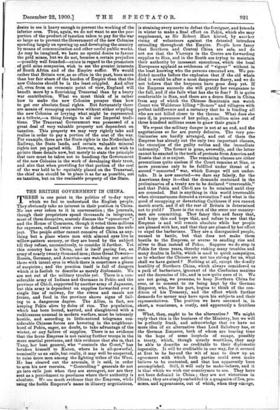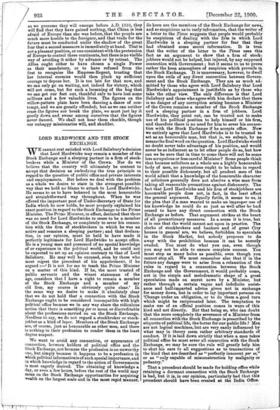THE BRITISH GOVERNMENT IN CHINA. T HERE is one point in
the politics of to-day upon which we fail to understand the English people. They obviously take no interest in their position in China. No one ever refers to it in conversation ; the journals, though their proprietors spend thousands in telegrams, most of them deceptive, scarcely discuss the "operations"; and the House of Commons, though it voted three millions for expenses, refused twice over to debate upon the sub- ject. The people either cannot conceive of China as any- thing but a place where men with almond eyes live in willow-pattern scenery, or they are bored by the subject till they refuse, unconsciously, to consider it further. Yet this country has in China, and is itself paying for, an army of nearly twenty thousand men ; three Great Powers— Russia, Germany, and America—are watching our action there with intent eyes in which there is sometimes a gleam of suspicion ; and the position itself is full of dangers which it is foolish to describe as merely diplomatic. We are not out of the military trouble yet. There is a con- siderable army of Indians and Germans in Pekin and the province of Chi-li, supported by another army of Japanese, but this army is dependent on supplies forwarded over a single line of railway, for the rivers and canals are frozen, and food in the province shows signs of fail- ing to a dangerous degree. The Allies, in fact, are keeping Pekin alive by doles of rice. The population, which has been looted, harried, and slaughtered with a recklessness unusual in modern warfare, must be intensely hostile, and according to little-noticed telegrams con- siderable Chinese forces are hovering in the neighbour- hood of Pekin, eager, no doubt, to take advantage of the winter, or any failure of supplies. There is no evidence that the fierce Empress is not raising further troops in the more martial provinces, and this evidence that she is, that Tung, her best general, who "controls the Court," has betaken himself to Sansu, where he is all-powerful, nominally as an exile, but really, it may well be suspected, to raise more men among the fighting tribes of the West. He has cleared out the arsenals, it is said, in order to arm his new recruits. " Controlling " generals do not go into exile just when they are strongest, nor are they sent as a punishment to provinces where their authority is absolute. We see much evidence that the Empress, while using the feeble Emperor's name in illusory negotiations, is straining every nerve to defeat the foreigner, and intends in winter to make a final effort on Pekin, which she may supplement, as Sir Robert Hart hinted, by another rising of volunteers against the detested intruders extending throughout the Empire. People here fancy that Southern and Central China are safe, and do not see that the Viceroys in the Centre are forwarding supplies to Sian, and in the South are trying to maintain their authority by incessant executions, which the local Europeans applaud as evidences of " vigour " without in the least knowing who the persons executed are. We pre- dicted months before the explosion that if the old whale died it would be after a most dangerous flurry, and we do not believe that the harpoons have gone deep yet. If the Empress succeeds she will gratify her vengeance to the full, and if she fails what has she to fear? It is quite comfortable in Sian, and there are a. dozen Slane in China from any of which the Chinese Semiramis can watch Count von Waldersee killing "Boxers" and villagers with perfect indifference and a certainty that he is binding all who are not killed closer to the throne. What does she care if, in pursuance of her policy, a million mice out of three hundred millions cease to gnaw their grain ?
We repeat the military danger is not at an end, and the negotiations so far are purely delusive. The very pre- liminaries are hardly arranged, and out of them the Empress has already cut the only two important clauses, the execution of the guilty nobles and the immediate indemnity. The former is gone, avowedly, and the latter cannot be exacted in the teeth of protests from America, and Russia that it is unjust. The remaining clauses are either precautions quite useless if the Court remains at Sian, or mere promises only to be fulfilled under threat of a second " concerted " war, which Europe will not under- take. It is now asserted—we dare say falsely, for the Americans deny it—that the demands contained in the preliminaries of a treaty are to be declared " irrevocable," and that Pekin and Chi-li are to be retained until they are conceded. But is anything in this world irrevocable when circumstances demand a revocation ? and what is the good of occupying or devastating Caithness if you cannot march south, and if all the rest of Britain is determined not to yield ? There is the root of the error our country- men are committing. They fancy this and fancy that, and hope this and hope that, and refuse to see that the Empress is and will remain absolute while her people are pleased with her, and that they are pleased by her effort to expel the barbarians. They are a disorganised people, unused to battle, but that does not make them hostile to the Empress, or averse to sending rice and silver to Sian instead of Pam. Suppose we do stop in Pekin for three years, thereby risking many troubles and many doubts in India, which is used to quick campaigns, as to whether the Chinese are not too strong for us, what shall we have gained ? Nothing at all, except the deadly hostility of Northern China, which always considered us a pack of barbarians, ignorant of the Confucian maxims and the decencies of life, and is now quite sure of it. We are not going, we presume, to keep Northern China for ever, or to consent to its being kept by the German Emperor, who, for his part, begins to think of the con- dition of his Treasury, and the effect which further demands for money may have upon his subjects and their representatives. The position we have assumed is, in short, a wearisome, a costly, and apparently a fruitless one.
What, then, ought to be the alternative ? We might reply that this is the business of the Ministry, but we will be perfectly frank, and acknowledge that we have no more idea of an alternative than Lord Salisbury has, or the German Emperor, both of whom are beating time in the hope of some loophole of escape, possibly a treaty, which, though utterly worthless, they may be able to describe as creditable to their diplomatic ingenuity. It will be creditable in one way, for it seemed at first to be beyond the wit of man to draw up an agreement with which both parties could even make believe to be contented, and that has apparently been accomplished. Still, it will only be make-believe, and it is that which we wish our countrymen to see. They have not been defeated in China ; they are not victorious in China; they are simply embedded in a quagmire of lies, pro- mises, and appearances, out of which, when they emerge, / as we presume they will emerge before A.D. 1910, they will find that they have gained nothing, that China is less afraid of Europe than she was before, that the people are much more hostile to the foreigner, and that trade for the future must be conducted under the shadow of the great fear that a second massacre is immediately at hand. That is not a pleasant position, or one consistent with the pretension of Europe to control three continents, but there is no visible way of avoiding it either by advance or by retreat. The Allies ought either to have chosen a single Power as their mandatory, or to have refused from the first to recognise the Empress-Regent, trusting that her internal enemies would then pluck up sufficient courage to depose her. It is too late for that now, and we can only go on waiting, not indeed for victory, which will not come, but for such a loosening of the bog that we can get our feet out, thankful only to have lost some millions and a few valuable lives. The figures on the willow-pattern plate have been dancing a dance of con- tempt, and we are greatly offended; but as we can neither erase the figures nor break the plate, we must just lay it gently down and swear among ourselves that the figures never danced. We shall not bear them chuckle, though our unhappy missionaries will, and shudder.







































 Previous page
Previous page